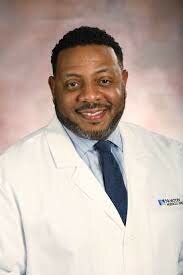By Sally McMahon
Last summer, Russell Cox, president and CEO, Norton Healthcare, outlined five imperatives to address health and racial inequalities. The first imperative was to establish the Institute for Health Equity and in August 2020, Kelly McCants, MD, was named executive director of the Institute. This month, we sat down with McCants to learn more about him and the program. Below are the highlights.
Medical News: Tell me about your family and your education.
Kelly McCants, MD: I grew up in Jacksonville, Florida and Tuscaloosa, Alabama. I am the first physician and fourth college graduate among 54 members of my extended family. My older brother, now a police captain, and my mother, who went back to school at age 40, were the first and second college graduates in my family.
I attended Tennessee State University and Meharry Medical College. I completed my internship, residency and fellowship at the University of Louisville. After a stint as director of cardiac transplantation at Piedmont Hospital in Georgia, I returned to Louisville.
MN: How did you come to be the executive director at the Institute for Health Equity?
KM: My passions are my medical practice and addressing health disparities. Through work with heart failure patients, I have learned the power of addressing socioeconomic dynamics to achieve heart recovery. When Russ Cox announced the creation of the Norton Institute for Health Equity, I immediately reached out to him to discuss how I could be involved.
The premise of the Institute is that health equity can only be achieved when every person has a fair opportunity to achieve their full health potential. I am proud that Norton Healthcare is striving for health equity and is committing time, talent and resources toward this essential human right. When offered, I gladly accepted the role.
MN: How does your background prepare you for this role?
KM: As an African American and a physician, I am deeply aware of structural racism and inequities, as I have experienced them personally. This helps me understand issues and concerns from a patient and provider perspective.
Unfortunately, there is mistrust of the medical community within certain populations. Patients need to be able to relate to their healthcare providers. We need to help Black students pursue their medical aspirations to give more Black patients access to providers they may better relate to.
Advanced heart failure often affects younger people and many of them do not have access to the healthcare resources they need. Having lived through similar life experiences allows me to relate to the problems associated with lack of easy access to primary care or advanced care. My practice is one of the few that employs a social worker so our patients can easily be connected to resources they need. I regularly help my patients with social issues, as well as medical issues.
MN: What are your goals for your first year at the Institute?
KM: The first is to improve access to healthcare in underserved areas. We know what neighborhoods are the most vulnerable. For example, our community needs assessment zeroed in on specific ZIP codes that have a shortage of pediatric and women’s health services. Women often are the heads of households in these communities, and they need easier access to screenings and other resources, which we will work to deliver.
The second is to anchor vulnerable neighborhoods with expanded health resources; position the Institute for Health Equity to serve as a central hub for community-based organizations and resources in a coordinated effort to expand access to housing, healthy food options, transportation and childcare. Our Institute will soon be based in the West End to improve our ability to provide and coordinate resources for this underserved community.
The third is to bring awareness to the historical disparities impacting certain communities. Work to eliminate barriers locally, regionally and nationally.
MN: What sort of partnerships are you forming in the community to accomplish those goals?
KM: By partnering with trusted community organizations, we provide COVID-19 testing, flu vaccines and now COVID-19 vaccines to underserved areas.
We are partnering with Simmons College of Kentucky and St. Stephen Family Life Center to bring primary care to the Shawnee neighborhood.
We partnered with United Way for its United Community initiative, which allows patients to easily connect with multiple social service and healthcare agencies to meet a variety of essential needs and reduce barriers to access.
MN: What is the most challenging problem you face today?
KM: There is good work being done to improve health equity and eliminate disparities. This is wonderful, but much of this progress is happening in silos. Our goal for the Institute for Health Equity is to help connect organizations to work together and efficiently address social determinants of health.
MN: Can you share information about programs being developed to eliminate health disparities within our local community?
KM: With the help of our Norton Healthcare Foundation, we added a second mobile prevention center. One is being outfitted to serve as a primary care clinic on wheels, while the other serves as a screening and prevention unit, including well-woman exams and colon cancer screenings. We are adding permanent clinics in underserved areas, but the geographic areas are large and these mobile units supplement and provide greater access to care. We will formalize the schedules of these mobile units so patients can rely on access during specific days and times. We soon will have a permanent location for our Institute for Health Equity in West Louisville.
